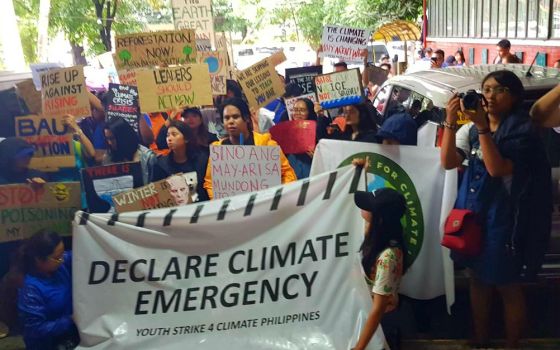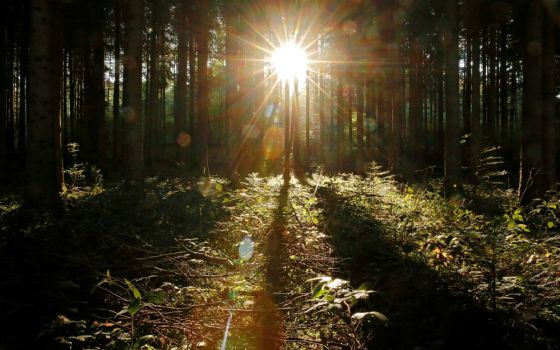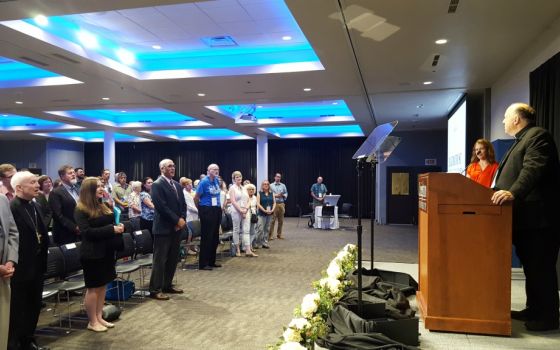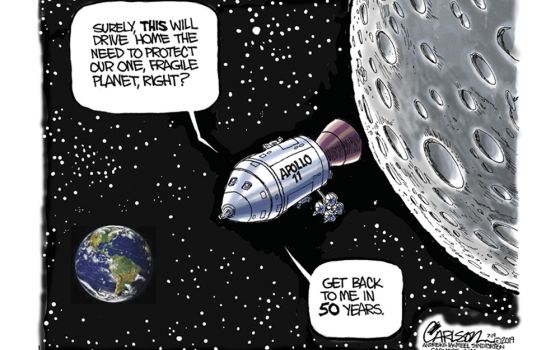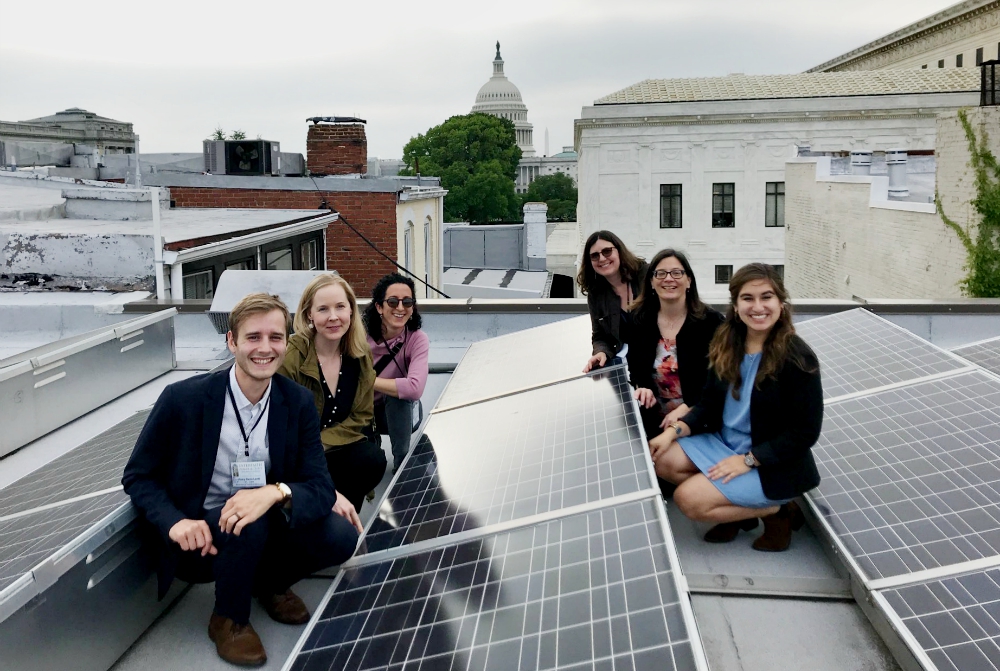
Members of Interfaith Power & Light pose near the solar panels on the roof of the Lutheran Church of the Reformation in Washington, D.C. On May 1, the environmental organization lobbied more than 100 congressional offices with their Faith Principles for a Green New Deal. (Interfaith Power & Light)
As debate around the Green New Deal continues, count more and more Catholics and religious leaders among those taking a closer look at the ambitious blueprint to address climate change.
Despite an early spring setback in the U.S. Senate, the Green New Deal, a plan to mobilize the United States in a decade to take serious steps on climate change, has not faded from the political scene.
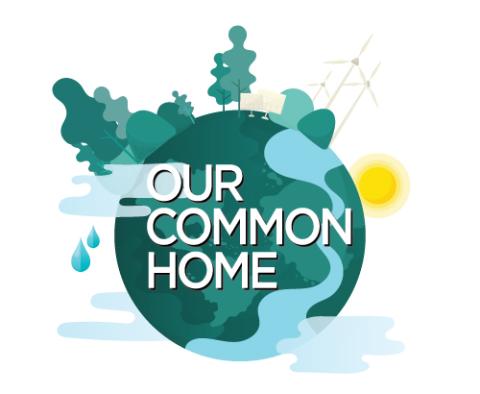
Instead, it has served as a prod and measuring stick for climate proposals from Democratic presidential hopefuls, the latest issued by Washington Gov. Jay Inslee. And while President Donald Trump continues to lambast the plan, most recently during a May 14 speech at a Louisiana natural gas facility, its supporters have brought the conversation this spring to cities across the country through a Green New Deal tour.
The climate action plan has also attracted attention from an increasingly curious religious community.
At its 20th annual prayer breakfast in early May, the National Religious Coalition on Creation Care — a network of primarily Christians and Jews that advocates on environmental issues in Washington, D.C. — lent its support to "the bold direction of the Green New Deal, or other similar science-based proposals, as an opportunity for this country to commit to stabilizing the climate" while at the same time to provide economic security and prosperity for all people in the country.
The 14-page nonbinding congressional resolution, introduced in both the Senate and House of Representatives, maps a 10-year path for the United States to achieve net-zero emissions and transition to 100% clean and renewable energy; build a sustainable infrastructure; provide all people access to nature and clean air and water; and in the process create millions of high-wage jobs and address present and past issues of inequality and injustice related to race, gender, health and housing.
In March, the Senate voted against advancing the resolution. All but three Democrats, including those seeking the White House in 2020, abstained and called the vote a political stunt meant to discredit the Green New Deal.
Public perception of the Green New Deal has also become more polarized. Sixty-nine percent of registered voters support the climate plan, according to an early April poll conducted by Yale University and George Mason University. That represents a 12% decrease from December, mostly driven by conservative Republican voters (from 57% to 32%) who have changed views after hearing more about it. Overall, 44% of Republicans support the plan, compared to 93% of Democratic voters and 64% of independents.
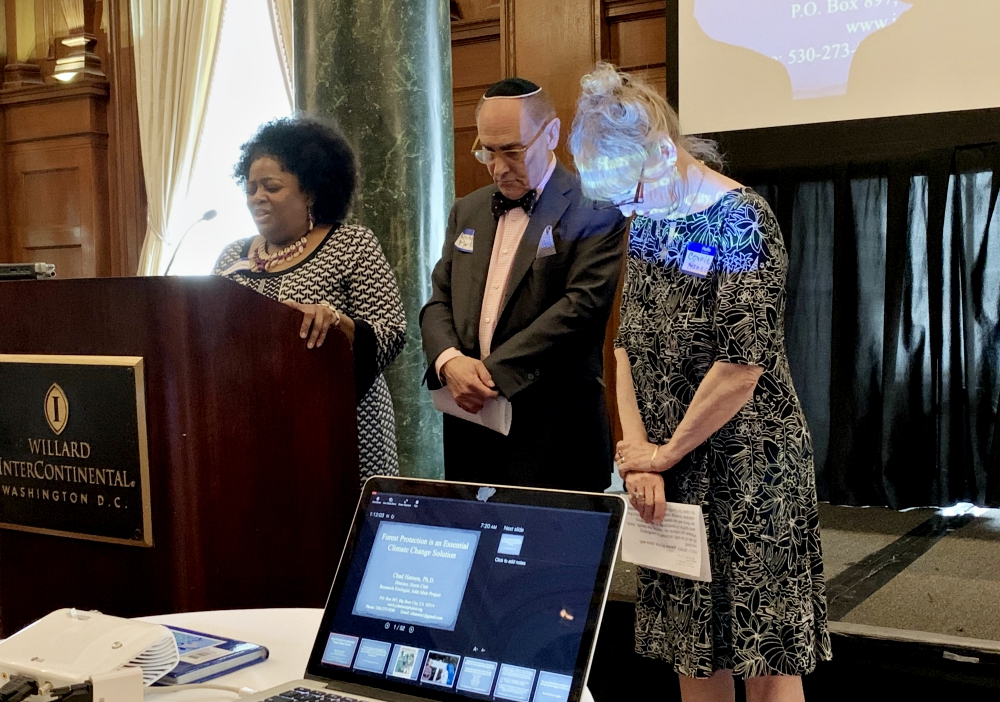
The Rev. Lisa Gray prays with Rabbi Richard Marker and Connie Hanson, president of Christians Caring for Creation, during the 20th annual prayer breakfast of the National Religious Coalition on Creation Care May 6 in Washington, D.C. (National Religious Coalition for Creation Care)
In its "Religious Declaration of Unprecedented Human Emergency," the National Religious Coalition on Creation Care, which shared the document in meetings on the Hill, said that climate change poses a challenge unlike any other that humanity has faced. It called the Green New Deal the first U.S. proposal "that addresses the climate crisis with the urgency, focus, and comprehensiveness that the situation requires."
The religious leaders did not limit themselves to a single plan and outlined other policies they support, such as a price on carbon dioxide emissions.
"Further delay in addressing climate change is a radical evil that as people of faith we vigorously oppose," the declaration said, adding, "While the means are open for debate, the end of preserving a stable climate is not."
The National Religious Coalition on Creation Care is one of several environmentally focused religious groups that have connected with the Sunrise Movement, a youth-led organization spearheading the push for a climate plan mirroring the sweeping set of major policies undertaken in the New Deal during the Great Depression. Others include GreenFaith, Interfaith Power & Light, the Poor People's Campaign and Catholic Climate Covenant. Those interactions have taken the form of webinars about the Green New Deal and strategizing how to lift up the voice of faith leaders as the discussion moves forward.
"Faith communities are essential to the fight to stop climate change, because they carry a moral vision of how we can be together and a stronger, healthier community than we often have now," said William Lawrence, partnerships director and co-founder for the Sunrise Movement.
Advertisement
He told NCR that as the Sunrise Movement has developed hundreds of hubs across the country, currently in 42 states, it has also worked to build alliances with other groups, including faith communities, whom he said the movement has turned to for inspiration for "what it looks like to call people to a higher moral standard."
"We've always been a movement that believes we need political change and we need social change in order to live right with the Earth and with each other. And you can't leave either part of that out, because to seek change without cultivating a moral, ethical change is very dangerous," he said.
Points of connection with Catholic teaching
In late April, the Catholic Climate Covenant hosted a webinar that brought the Sunrise Movement together with Catholics to examine what the Green New Deal actually says and what Catholic social teaching has to say about it.
The Catholic Climate Covenant has so far refrained from taking a position on the Green New Deal.
Erin Lothes Biviano, a theologian specializing in energy ethics at the College of St. Elizabeth, in Morristown, New Jersey, parsed through the resolution piece by piece and stacked each against church beliefs.
There are "many points of connection between the Green New Deal and Catholic social teaching," she said.
On the goal of net-zero greenhouse emissions, for instance, she said it aligned with what Pope Francis said in his encyclical "Laudato Si', on Care for Our Common Home," that "the use of highly polluting fossil fuels ... needs to be progressively replaced without delay." Catholic social teaching also shows support, she said, of goals to mitigate health and economic effects from climate change, secure access to a sustainable environment and promote justice and equity, along with the resolution's principles of solidarity and participation.
Still, the connections weren't all straightforward.
Lothes Biviano said that while Catholic social teaching supports the idea in the Green New Deal of creating high-wage jobs and guaranteeing people a right to a job, fair wages, health care and housing, who ensures those rights is less clear.
She referenced how Gaudium et Spes, one of the major documents that emerged from the Second Vatican Council, talks about the social order as obligated to provide such rights. Pope John Paul II's 1981 encyclical, Laborem Exercens, she added, stressed coordination over centralization, and for the state to create the conditions to ensure job opportunities.
At the same time, she said, Catholic social teaching doesn't hold the role of the state as static in all circumstances, particularly in times of crisis.
"And we are certainly in a moment of crisis, which calls for, I believe, a particular duty of the state," she said.
Marianne Comfort, justice coordinator for Earth, anti-racism and women for the Sisters of Mercy of the Americas, said the sisters are looking at the Green New Deal for elements they can embrace at all levels of government. One important area is in its justice and equity language, and that future climate solutions don't repeat mistakes of the past.
"Just like we put chemical plants and fossil fuel infrastructure in the most vulnerable, low-income communities, we want to make sure we don't do the same with renewable projects," she said during the webinar. "That we involve local communities, and make sure that we're siting solar farms and wind farms in places where the communities welcome them and it's not adversely impacting them."
Lothes Biviano acknowledged that the Green New Deal sets ambitious goals and an even more ambitious timeline that many have called unobtainable. She said it was important to be open to multiple ideas, but that scientific reports affirm increased urgency in accelerating efforts to put them into action.
"We don't know what will be possible within 10 years unless we aim for it," she said.
Evan Weber, national political director and another co-founder of the Sunrise Movement, stressed that the Green New Deal "is a vision for the future of American society," and that multiple pieces of legislation would be needed to achieve all its goals.
"It is a promise to current and future generations of a more just and equitable future," he said. "And like I said before, it's doing what America does best — it's taking an incredible threat and crisis and turning it into an incredible opportunity."
During the webinar, Weber recapped the rise of the Sunrise Movement, which he said began two years ago with "a group of us hoping to be able to bring in the moral urgency that we feel as young people and our generation around the crisis of climate change to the rest of the American public."
He said one of its initial goals was to make climate change matter in political discussions and elections. He pointed to the thousands of articles and ongoing debate activated by the Green New Deal, and the election to Congress of climate advocates like Rep. Alexandria Ocasio-Cortez (D-New York), the resolution's lead sponsor in the House, as successes.
As the Sunrise Movement looks ahead, Weber sees opportunity in further engaging religious communities.
"Young people and people of faith, I think, can be extremely important allies in this fight as moral messengers," he said.
'A profound moral opportunity'
In early May, faith groups organized by Interfaith Power & Light delivered to more than 100 members of Congress a central set of "Faith Principles for a Green New Deal." Among those who signed on to the letter were 29 Catholic organizations, including the Leadership Conference of Women Religious, the Conference of Major Superiors of Men, several religious order social justice advocacy groups, and nearly two dozen Catholic sisters congregations.
The faith principles do not formally endorse the Green New Deal resolution, but referred to it as "a profound moral opportunity." Still, many of the faith principles lend support to elements already in the Green New Deal.
Comfort told NCR in an email that the Sisters of Mercy were "pleased to sign onto these principles and use them to assess any proposed climate legislation."
Despite the political setback in the Senate, Avery Davis Lamb, federal policy associate for Interfaith Power & Light, said that the goal of the faith principles was "to ensure that our lawmakers are hearing how the faith community is framing the values that undergird our support of ambitious climate legislation."
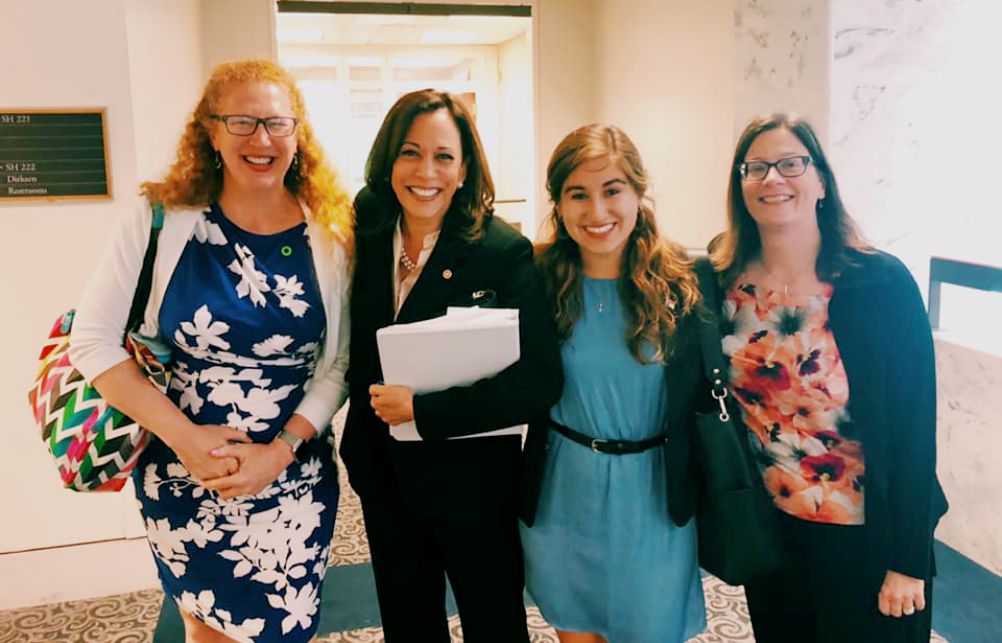
Leaders of Interfaith Power & Light meet with U.S. Sen. Kamala Harris of California May 1 after delivering their Faith Principles for a Green New Deal. (Interfaith Power & Light)
"Collectively, we have the chance to respond to the ecological and economic crises facing our shared home with bold and hopeful action," the faith principles document states. "As people of faith and conscience, we are called to care for this world and its people.
"Climate change presents a grave danger to our neighbors at home and across the globe, to the ecosystems that sustain life, and to future generations. Hurricanes, droughts, wildfires, and floods are devastating the lives and livelihoods of millions, with the greatest impact felt by those who are least able to adapt. We know that inaction is harmful."
The faith principles for a Green New Deal call for aligning plans for a clean energy economy with the scientific consensus on climate change and what is necessary to limit warming below the more dangerous levels.
In October, the United Nations Intergovernmental Panel on Climate Change reported global carbon emissions need to decline by 45 percent from 2010 levels by 2030 and reach net-zero by 2050 in order to hold average temperature rise below 1.5 degrees Celsius (2.7 degrees Fahrenheit). Warming above that level will bring about more severe impacts, including increased droughts, severe storms, wildfires and extreme weather events, the report said.
In their principles, the faith leaders also urged the inclusion of jobs programs and education in any climate policies, with an emphasis on the economically disenfranchised, people of color, women and indigenous communities, and to use the clean energy transition to counter steadily rising economic inequality. They also stated there must be just treatment for all workers and communities involved, with particular focus on those working in the extraction and refining of fossil fuels "and a recognition for their contributions to society."
Policies to transform the economy, the principles said, must also better prepare communities to withstand extreme weather and become more resilient long term to a changing climate.
Finally, they urged U.S. climate policy to support communities around the globe on the front lines of the impacts of climate change, and share technology to help other countries develop their own clean energy solutions.
"We hope, pray, and advocate that any legislation written to achieve the goals of the Green New Deal will address the urgency of the climate crisis and seize the opportunity to create a new, more just and livable world for communities and our sacred Creation," the faith principles stated.
That the Green New Deal has spurred extensive discussion and attention toward solutions to climate change is a sign of hope, Lothes Biviano said during the Catholic Climate Covenant webinar. While gaining better understanding of what the Green New Deal says and how that pairs with faith values is important, too, she said even more important is to speak directly to elected leaders.
"Go to your desk, get an envelope, get a stamp, sit down and instead of listening to me, write to your congresspeople, because they need to hear from us. And that's the first way that we need to respond," she said.
[Brian Roewe is an NCR staff writer. His email address is broewe@ncronline.org. Follow him on Twitter: @BrianRoewe.]





